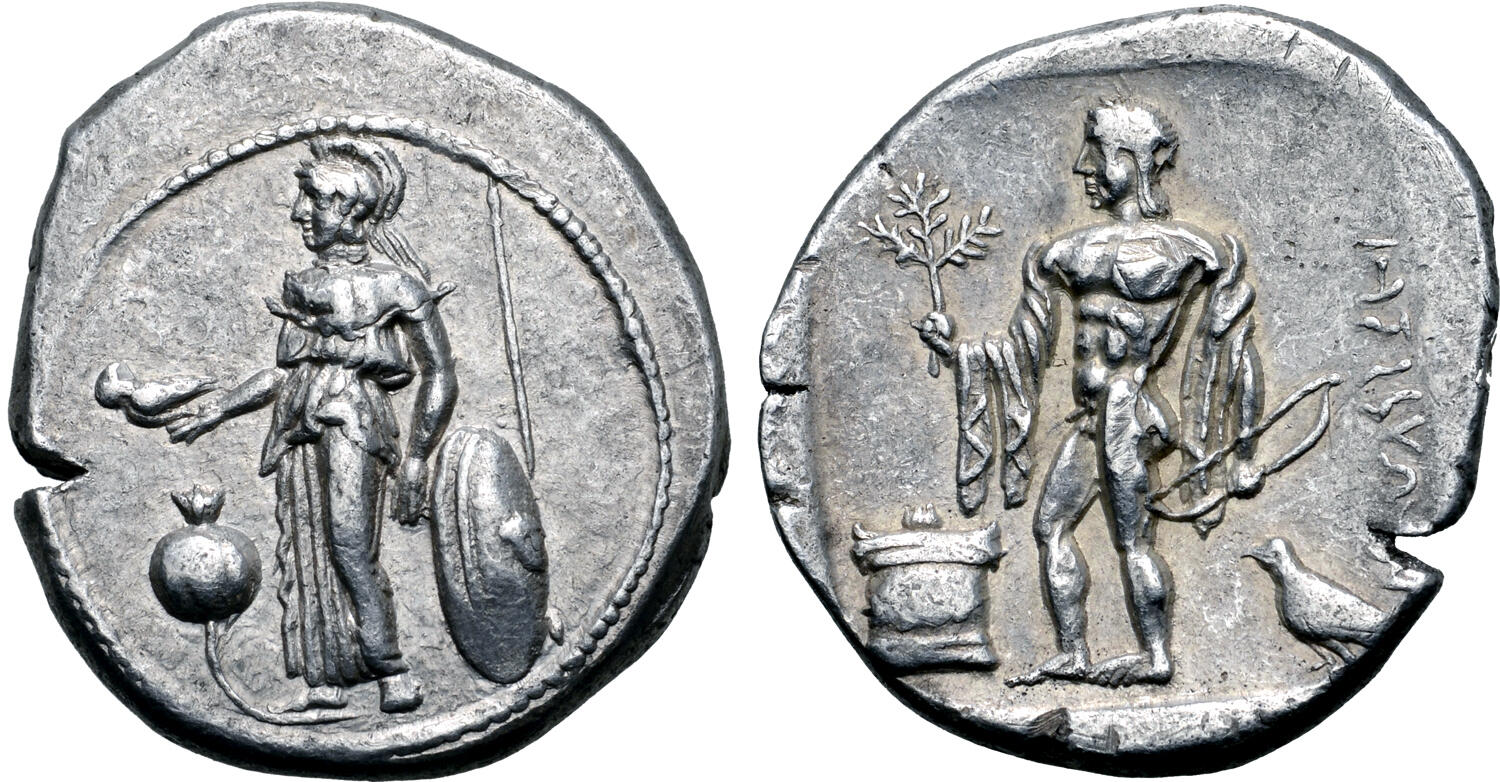Side, silver, double sigloi (Athena/Apollo) (400-375 BCE)
From SILVER
(Redirected from Side, silver, double sigloi (400-375 BCE))
400 BCE - 375 BCE Silver 7,620 kg
Description
| ObverseInscription or printing placed on the obverse.: | Athena standing to left, holding owl upon her outstretched right hand and resting shield against her left, pomegranate before, grounded spear behind. |
| ReverseInscription or printing placed on the reverse.: | Apollo standing to left, nude but for chlamys over shoulders, holding laurel branch over altar in right hand and bow in left, raven and ethnic in Sidetic behind, all within incuse square. |
Mint and issuing power
| MintIdentifies the place of manufacture or issue of a numismatic object.: | Side | Ancient regionAncient region.: | Pamphylia | Modern countryModern country: Turkey | AuthorityIdentifies the issuing power. The authority can be "pretended" when the name or the portrait of X is on the coin but he/she was not the issuing power. It can also be "uncertain" when there is no mention of X on the coin but he/she was the issuing power according to the historical sources: | Persian Empire |
Chronology
| FromIdentifies the initial date in a range assigned in a numismatic context. | 400 BCE | toIdentifies the final date in a range assigned in a numismatic context.. | 375 BCE | PeriodTime period of the numismatic object.: Classical 480-323 BC |
Physical description
| MetalThe physical material (usually metal) from which an object is made.: | Silver |
Median weightMedian of the weights of numismatic objects (in grams). in grams | 10.80 | DenominationTerm indicating the value of a numismatic object. Examples: tetradrachm, chalkous, denarius.: | stater |
StandardStandard.: | Persian |
Image

AC269 Side.jpeg [1]
References
| Die study referencePublication of the study: | Atlan 19671Atlan 1967, n° 43-62. | ||
| Coin series referenceReference to coin series study: | Sear II2Sear II, n° 5428, RQEMAC3RQEMAC, n° 269 | ||
| Coin series web referenceCoin series web references: | |||
Obverse dies distribution
| FrequencyFrequency of specimen in distribution. ᵖ | Number of obversesNumber of obverse dies. ᵖ (o) | % (o) | Number of coinsNumber of coins. (n) | % (n) | Die nameName(s) of the die(s). |
| 1 | 14 | 70 | 14 | 37.84 | 43, 44, 46, 47, 48, 49, 50, 52, 54, 57, 59, 60, 61, 62 |
| 2 | 3 | 15 | 6 | 16.22 | 45, 55, 58 |
| 3 | 1 | 5 | 3 | 8.11 | 56 |
| 6 | 1 | 5 | 6 | 16.22 | 53 |
| 8 | 1 | 5 | 8 | 21.62 | 51 |
| Total | 20 of 20 | 100 | 37 of 37 | 100.01 |
Reverse dies distribution
no distribution is available
Quantification
| Number of obversesNumber of obverse dies. ᵖ (o) | 20 | Number of singletons (o1)The number of singleton coins. ᵖ | 14 |
| Number of reverse diesNumber of reverse dies. (r) | 25 | Number of coinsNumber of coins. (n) | 37 |
| Coins per obverse dieNumber of coins per obverse die. (n/o) | 1.85 | Coins per reverse dieNumber of coins per reverse die. (n/r) | 1.48 |
| Reverse per obverse ratioRatio of obverse dies divided by reverse dies. (r/o) | 1.25 | Percentage of singletons (o1)number of coins (n) divided by the number of singletons (o1) ᵖ | 70 % |
| Original number of dies (O) (Carter 1983 formula)The estimation of the number of coins according to Carter 1983 ᵖ | 35.28 | Coins struck if 20,000 as average productivity per dieCoins made if the average productivity for obverses (according to Carter) is 20,000. ᵖ | 705,600 |
| Original number of dies (O) (Esty 2011 formula)The estimation of the number of coins according to the singleton formula in Esty 2011 ᵖ (O) | 43.53 | Survival rate if 20,000 as average productivity per dieSurvival rate if average productivity is 20,000. ᵖ | 0.00005 |
| Coverage (o = % of O) (Esty 1984 formula)Esty 1984 - coverage (% of O) ᵖ (o = % of O) | 62.16% | Die productivity if survival rate 1/2,000Average productivity if survival rate is 1/2,000. ᵖ | 2,097.51 |
| Weight of silver (in kg) if 20,000 coins per die (O = Carter formula)Carter 1983 * Median weight * 20000 (*10 if gold or electrum) ᵖ | 7,620 kg <br /> 7,620 kg | Die productivity if survival rate 1/5,000Average productivity if survival rate is 1/5,000. ᵖ | 5,243.76 |
Remarks
Most likely one single workstation Likely military
References
- ^ Atlan, Sabahat (1967), Untersuchungen über die sidetischen Münzen des V. und IV. Jahrhunderts v. Chr., Ankara, 181 p., 12 pl.
- ^ Sear, David R. (1979), Greek coins and their values. Vol. II, Asia and North Africa, London, xlviii, p. 317-762
- ^ Callataÿ, François de (2003), Recueil quantitatif des émissions monétaires archaïques et classiques, Numismatique Romaine, Wetteren, VII + 267 p.